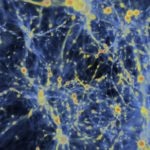The cosmic war between dark matter and dark energy
Since the universe was formed, matter and dark energy have waged a battle of epic proportions. The astrophysicist Catherine Heymans explained it this way at the BBVA Foundation: "The gravity of dark matter tries to keep everything together, but its evil sister, dark energy, undoes its work and ensures that our universe expands more rapidly every day".

Although it is hard for us to believe since we see images of bright constellations, nebulas, and the births and deaths of stars, most of our universe is dark – no less than 95% of it. And, it is dark in two senses: in that it cannot be detected directly because it does not emit light, and in that it remains hidden from our understanding because we still do not know exactly what it is made of.
However, we know that it is composed of something since this something interacts with visible matter and affects how the latter behaves. Based on this interaction, cosmologists have proposed the existence of dark matter and dark energy in these invisible realms. One of the main challenges of cosmology today is to definitively prove that they exist, and to understand their role in the cosmos.
Dark matter is matter that we cannot see, but the effects of its gravity on visible matter can be detected. Catherine Heymans, an astrophysicist at the University of Edinburg who was in Madrid this week to participate in the cycle of conferences given by the BBVA Foundation entitled “Science of the Cosmos, Science in the Cosmos”, explained that, among other things, dark matter is responsible for the fact that galaxies maintain their shape: “There is an enormous conglomeration of dark matter surrounding the Milky Way. If it wasn’t there, the stars that form in our galaxy would simply fly off into the universe.”
Dark energy, on the other hand, is a concept that arose as an attempt to explain one of the most profound mysteries surrounding the expansion of the universe: Why, far from slowing or stopping, as might be expected, does our universe expand more rapidly every day? Scientists theorise that dark energy is the explanation since it continually creates more space between galaxies.
Nevertheless, Heymans believes that we still haven’t learned much, and that what we have learned is not very convincing. For example, the LHC, CERN’s particle accelerator, still has not been able to capture a particle of dark matter. And, as regards dark energy, there is still no agreement on a theoretical model that might prove its existence.
Given this, Heymans is convinced that the key to solving the mystery is a mix of “data and genius”. The collection of data is not easy since the effects sought are extremely slight. Heymans: “However, the exciting thing is that, for the first time, we now have technology that will allow us to make the observations: large telescopes based on earth and in space, and the computational capacity required to analyse the enormous quantities of data that will be provided.”
The second element in the mix consists of generating new ideas that will lead to a “new physics” that will revolutionise our concept of reality, just as general relativity and quantum mechanics did in their day.